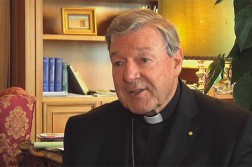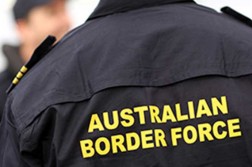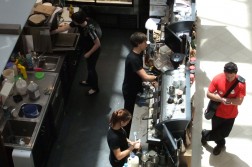Sport and race have always been uneasy bedfellows. One only has to look at South Africa, where even now the World Cup is struggling to overcome a troubled racial history, as the white minority begins to forgive the blacks for their ill-mannered numerical advantage.
In a case like this, sport acts as a healing agent for racial problems, but there are also occasions where sport just inflames such tensions. Take for example the 2005 Ashes series, which simply entrenched the stereotype that all English people are awful, as well as all the other Ashes series which did essentially the same thing. Or look at the Socceroos’ 1997 exit in the World Cup qualifying stages, which was pretty much the starting point for anti-Muslim hatred in this country.
So there are two sides to interracial mingling in the world of sport. And rugby league is no exception. Rugby league has always been a multicultural sport, ever since the day Herbert "Dally" Messenger first gave a small Negro boy a farthing for polishing his boots; and it has a proud history of enormous contributions from players of all races, from Mal Meninga’s barnstorming runs, to Benny Elias’s subtle ball-play, to Noa Nadruku’s entertaining name.
And every rugby league fan worth his (or, theoretically, her) salt would be saddened and disappointed by the recent events in the NSW State of Origin camp, where Timana Tahu walked away from the team in protest at racial slurs used by assistant coach Andrew Johns. And the sadness will come on several fronts.
Firstly, fans of NSW will be upset at all the turmoil on the eve of such an important match, just when it seemed that after four straight series defeats, the tide had turned and hope was burgeoning that the Queensland team might get hit by a train or something.
Secondly, all rugby league lovers will be shocked and appalled that Andrew Johns, probably the greatest player to ever pull on a boot, and almost certainly the greatest player ever to be arrested for possession of ecstasy, has turned out to be the sort of person who would make racist remarks. Let’s hope he hasn’t damaged the reputation of the Johns family irreparably.
But most importantly, it is terribly unfortunate that the affair has sparked such a disproportionate and hysterical media reaction, without any regard for culture or context or backline structures.
Look, nobody likes racism. Or at least, most people don’t like racism — some people love it, and who are we to tell them they’re wrong? If we condemn people simply because they are racist, isn’t that the worst kind of racism of all? Just imagine if your son or daughter was a racist, and they came home from school in tears one day because the other children had been making fun of their racism. Really brings it all home to you, doesn’t it? Makes you think. Makes you feel ashamed of your prejudice. Makes you realise how Mrs Johns must be feeling, with all these bigots calling her son a racist all over the papers.
But sure, racism is, all in all, not a great thing. But there’s a very important point we’re missing here: this is rugby league. It’s not regular society, where you might get frowned upon if you yell "Nigger" on a crowded city street, or hit a Sri Lankan with your umbrella. It’s a rarefied, hyper-real, intensely physical situation, where the law of the jungle takes precedence over the law of the city. And let’s face it, when you’re in the jungle, hitting a Sri Lankan with an umbrella might be the least you have to do to get by, but there are those who will tell you that even saying so is racist.
Rugby league players do all sorts of things on the field they wouldn’t do off the field. Off the field, they wouldn’t go around knocking each other over. Off the field, they wouldn’t thrust their heads betwixt other men’s thighs. Off the field, they wouldn’t hang around in close proximity to Paul Gallen. It’s a whole different atmosphere, and we have to accept that the niceties of polite society do not necessarily apply. You and I might never dream of calling Greg Inglis a "black c#&t", but then, you and I would also never dream of driving our shoulder forcefully into his ribs — or, as we’re talking State of Origin here, of snatching effeminately at his arms with our fingers as he runs casually past us. If we were members of the NSW Origin team, we might well behave differently, if only due to the self-esteem issues.
And I think that this, in the end, was the point Andrew Johns was trying to make. That if you want to defeat the Queenslanders, you have to change the rules. You have to demystify the opposition. You have to stop thinking of them as the all-conquering Maroons, superior in strength, speed, skill and general attractiveness. You have to start thinking of them as fallible mortals, and what better way to do this than by referring to them with vicious racial epithets? Oh sure, you might say, "There are many better ways to do this," but you’re not a rugby league legend, are you? You don’t have the innate ability to "think outside the box" that allowed Joey Johns to scoot down the blind-side and send Darren Albert over in that epic 1997 grand final, do you? Be honest, if I asked you to scoot down the blind-side, right now, you’d fall in a gibbering heap. So it’s a bit rich of you now to be questioning his motivational techniques. Come back and see me when you’ve demonstrated your ability to spot a gap, jink one way, accelerate the other, and then deliver a perfectly-weighted look-away banana chip to the right corner for your winger to score untouched. I won’t hold my breath, losers.
The basic, fundamental, essential, core, bare-bones, hardnosed point here is that we hold different expectations of our elite sportspeople to those we do of other folk. For example, we expect ordinary citizens to behave with decency and respect towards members of the opposite sex, whereas with footballers we pretty much consider it a win if they return a girl’s underpants within six to eight weeks of an assault. Likewise, we expect ordinary citizens to refrain from calling other ordinary citizens black c#&ts as much as possible, but given how much footballers have on their minds — scrum moves, 40–20s, memorising Footy Show skits — it is surely no hanging offence if occasionally they forget such details.
And really, hasn’t Johns performed a useful service for us? Isn’t it good we’re all talking about issues of racism now? Everyone’s having a frank, healthy discussion about the problems that beset our society and sporting landscape, and that can only be a good thing. After all, if nobody was racist, we would never discuss racism! Do we really want that? No. We need racists, because without them, we’ll never get rid of racism.
We certainly don’t want our children going around thinking racism isn’t a problem just because nobody is racist. YOU might want your children to grow up as fragile sheltered albino hothouse flowers, but I want a more robust world. I want more racists being courageous enough to come out and speak their minds, creating a non-judgemental space where we can thrash all these complicated issues out, and come to an understanding with our racist brothers and sisters.
So thank you, Joey. Thank you for coming out of the closet and sparking some much-needed debate. Racism is a real problem, and it’s one we’ll never solve unless racists everywhere stand up and say, "Yes, I am racist, and I have something to say!"
In this, as in all things, footballers lead the way. God bless them all.
Donate To New Matilda
New Matilda is a small, independent media outlet. We survive through reader contributions, and never losing a lawsuit. If you got something from this article, giving something back helps us to continue speaking truth to power. Every little bit counts.



